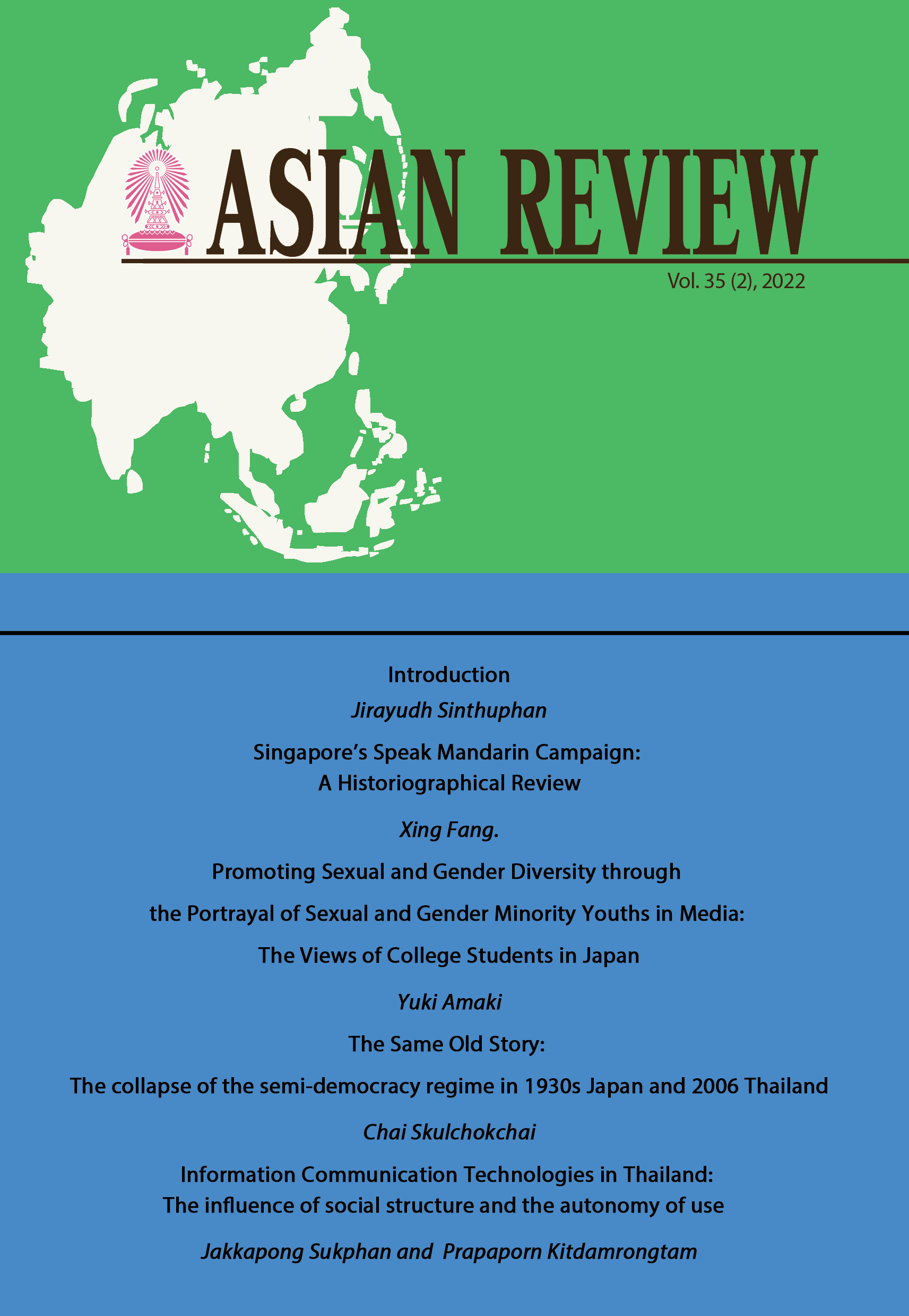Singapore’s Speak Mandarin Campaign: A Historiographical Review
Keywords:
Speak Mandarin Campaign, nation building, identity, linguistic capital, language shift, globalizationAbstract
Language policy functions as a critical instrument in
Singapore’s nation building since its independence in the 1960s. This
paper intends to examine some major literature in the past fifty years
concerning Singapore’s well-known Speak Mandarin Campaign, in
order to reveal the chronological development in scholarship. The
content of the literature foregrounds paradigm shifts from viewing
Mandarin as an identity marker to valuing it as linguistic capital, and
from treating identity as a bounded concept to acknowledging its
fluidity in the context of globalisation. The evident historical changes
in the writing of the studies also reflect shifts in terms of the scholars’
gaze in research, the core subject under investigation, the meaning
of critical notions such as national identity and Mandarin, as well as
research methods adopted and sources analysed. These findings could
reinforce understanding of the scholarly developments concerning
Singapore’s language policy and inform the direction for investigating
recent progress of the Speak Mandarin Campaign and Singapore’s
national identity formation.
References
Bokhorst-Heng, Wendy D., and Lionel Wee. 2007. “Language Planning in Singapore: On Pragmatism, Communitarianism and Personal Names.” Current Issues in Language Planning 8(3): 324-343.
Chan, Leong K. 1999. “Communication, National Identity and Cultural Identity in Singapore: Graphic Responses to the ‘Speak Mandarin’Campaigns.” The Design Journal 2(1): 24-38.
Chua, Siew Kheng Catherine. 2010. “Singapore's Language Policy and Its Globalised Concept of Bi(tri)lingualism.” Current Issues in Language Planning 11(4): 413-429.
Curdt-Christiansen, Xiao Lan. 2014. “Planning for Development Or Decline? Education Policy for Chinese Language in Singapore.” Critical Inquiry in Language Studies 11(1): 1-26.
Ginsberg, Norton S. 1955. “The Great City in Southeast Asia.” American Journal of Sociology 60( 5): 455-462.
Gopinathan, Saravanan. 1979. “Singapore's Language Policies: Strategies for a Plural Society.” In Southeast Asian Affairs 1979, edited by Leo Suryadinata, 280-295. Singapore: ISEAS Publishing.
Gupta, Anthea Fraser, and Siew Pui Yeok. 1995. “Language Shift in a Singapore Family.” Journal of Multilingual & Multicultural Development 16(4): 301-314.
Harrison, Godfrey. 1980. “Mandarin and the Mandarins: Language Policy and the Media in Singapore.” Journal of Multilingual & Multicultural Development 1(2): 175-180.
Kuo, Eddie C. Y. 1984. “Mass Media and Language Planning: Singapore's ‘Speak Mandarin’ Campaign.” Journal of Communication 34( 2): 24-35.
Kuo, Eddie C. Y. 1985. “Language and Identity: The Case of Chinese in Singapore.” In Chinese Culture and Mental Health, edited by Wen-Shing Tseng and David Y. H. Wu, 181-192. Orlando: Academic Press.
Li, Wei, Vanithamani Saravanan, and Julia Ng Lee Hoon.1997. “Language Shift in the Teochew Community in Singapore: A Family Domain Analysis.” Journal of Multilingual and Multicultural Development 18(5): 364-384.
Lim, Jun Jie, Spencer C. Chen, and Mie Hiramoto. 2021. “‘You Don't Ask Me to Speak Mandarin, Okay?’: Ideologies of Language and Race Among Chinese Singaporeans.” Language & Communication 76: 100-110.
Newman, John. 1988. “Singapore's Speak Mandarin Campaign.” Journal of Multilingual & Multicultural Development 9( 5): 437-448.
Ng, Patrick Chin Leong. 2017. A Study of Attitudes of Dialect Speakers Towards the Speak Mandarin Campaign in Singapore. Singapore: Springer.
Nyíri, Pál. 1997. “Reorientation: Notes on the Rise of the PRC and Chinese Identities in Southeast Asia.” Southeast Asian Journal of Social Science 25(2): 161-182.
Poh-Seng, Png. 1976. “Racial Integration and Nation-building in Singapore.” In Philippine Sociological Review 24(1): 73-79.
Quah, Jon S. T. 1977. “Singapore: Towards a National Identity.” In Southeast Asian Affairs 1977, edited by Huynh Kim Kanh, 207-219. Singapore: ISEAS Publishing.
Silver, Rita Elaine. 2005. “The Discourse of Linguistic Capital: Language and Economic Policy Planning in Singapore.” Language Policy 4(1): 47-66.
Teo, Peter. 2005. “Mandarinising Singapore: A Critical Analysis of Slogans in Singapore’s ‘Speak Mandarin’ campaign.” Critical Discourse Studies 2(2): 121-142.
Wee, Lionel. 2003. “Linguistic Instrumentalism in Singapore.” Journal of Multilingual and Multicultural Development 24(3): 211-224.
Downloads
Published
How to Cite
Issue
Section
License
Copyright (c) 2022 Institute of Asian Studies Chulalongkorn University.

This work is licensed under a Creative Commons Attribution-NonCommercial-NoDerivatives 4.0 International License.
Published articles are under the copyright of the Instiute of Asian Studies, Chulalongkorn University. Partially or totally publication of an article elsewhere is possible only after the consent from the editors.







